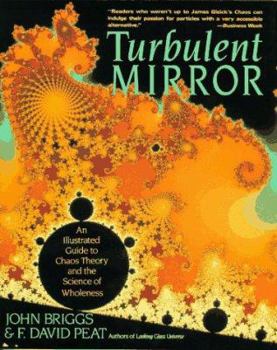Turbulent Mirror: An Illustrated Guide to Chaos Theory and the Science of Wholeness
Select Format
Select Condition 
Book Overview
Until recently, such phenomena as the volatility of weather systems, the fluctuation of the shock market, or the random firing of neurons in the brain were considered too "noisy" and complex to be probed by science. But now, with the aid of high-speed computers, scientists have been able to penetrate a reality that is changing the way we perceive the universe. Their findings -- the basis for chaos theory -- represent one of the most exciting scientific...
Format:Paperback
Language:English
ISBN:0060916966
ISBN13:9780060916961
Release Date:May 1990
Publisher:Harper Perennial
Length:224 Pages
Weight:0.93 lbs.
Dimensions:0.4" x 7.4" x 9.3"
Customer Reviews
4 ratings
A readable description of the theory of order out of chaos.
Published by Thriftbooks.com User , 18 years ago
Here is an easy to read exposition of the theory of order out of chaos and how the natural world arises from basic natural processes repeated over and over again. The relevance of fractals to this study is given as well as a description of psychic processes. A must read for anyone interested in the new science. All the more complex theories of interest to the magical endeavor are based on the ideas presented in this book. It's an excellent companion to James Gleick's "Chaos."
A Book Ahead of its Time - still
Published by Thriftbooks.com User , 19 years ago
A wonderful synthesis of science at the edge. A grasp of how scientific methodology is changing to accommodate the revelations of chaos theory. The used edition I read was from 1990 and is prescient even now (alas). The informed and illuminating evidence that revolutionizes the current Neo-Darwinistic paradigm of molecular evolutionary theory towards the end of the book was particularly refreshing. John Briggs and F. Peat's thinking is so strikingly lucid, informed, and visionary that this book will fail to make almost any lecture list where it is most needed for years to come.
IGNORE CHAOS AT YOUR PERIL
Published by Thriftbooks.com User , 24 years ago
Very well thought out survey of chaos theory presents a metaphorical mirror as a means to magnify and project into view the hidden world of turbulence. The advent of the computer has brought chaos and fractals out of the closet. Here the authors teach the reader how to navigate in the turbulent world from the submicroscopic realms to the distant galaxies. The authors dish up a huge concept list: fractal dimensions, strange attractors, holograms, soliton bubbles, bifurcation, quantum phase locking, coevolution of species and the earth as Gaia -- all in an attempt to teach the reader the folly of allowing the part/whole dichotomy to rule your perception of the universe. The book is a stark attack on those the authors term reductionists -- those who seek answers in breaking the whole into ever smaller parts. The authors' pet writers are David Bohm, Lynn Margulis, and Llya Prigogine but they toss in another hundred ideas for irregular stepping stones to get where they are going. Where is that? They composed an evangelical message -- that man now has the tools and knowledge to step through Alice's Looking Glass into an entirely new and mystical perception of the whole. They see chaos as a source of future evolution and life. I give the authors a high mark for original thought. Although using a hundred other science writers to frame their ideas, they direct the reader to go beyond existing theories and strike a path for the center of the turbulent mirror. The diagrams and illustrations also were very helpful. They pictured the brain as a strange attractor, with thought arbitrating between the two realms of order and chaos. My favorite metaphor was the slime mold which, when food gets scarce, merges from being a collection of individual cells to a collective entity moving across the forest floor. This was to show an example of quantum phase locking which "could provide a bridge joining classical, nonlinear reality with linear, quantum reality" (P. 188). Great Two Thousand year Philosophy.
Terrific Book
Published by Thriftbooks.com User , 25 years ago
This book provides a great introduction to chaos theory and strikes a devastating blow to reductionism. Using a historical approach, the book walks the reader through the discoveries and mathematics that underlie fractals, chaos and complexity. It also provides a short, fascinating interview with Ilya Prigogine and a great layperson's introduction to his ideas. Turbulent Mirror makes the point that because of "sensitive dependence on initial conditions" one can not really separate the whole from the parts - in essence there really are no "initial conditions." The only weakness of this book, IMHO, is the use of occasional Alice and Wonderland illustrations and a few too many quotes from eastern philosophy. These are not overpowering, however, so if you don't like them them can ignore them and enjoy the rest of the material which is truly great.





